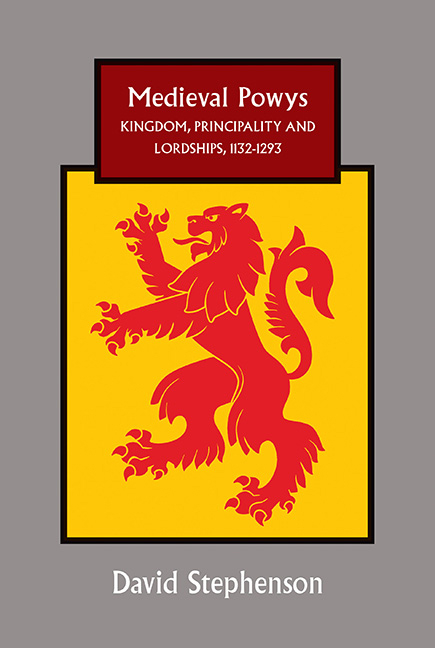Book contents
- Frontmatter
- Dedication
- Contents
- List of Illustrations
- Acknowledgements
- Abbreviations
- Map
- Miscellaneous Frontmatter
- Introduction: The problem of medieval Powys: historiography and sources
- Part I Powysian Polities in the Twelfth and Thirteenth Centuries: A Political Narrative
- 1 The re-emergence of Powys
- 2 The age of eminence: Madog ap Maredudd
- 3 Crisis and renewal: 1160 and its aftermath
- 4 The ascendancy and fall of Gwenwynwyn
- 5 Eclipse: the supremacy of Gwynedd
- 6 Survival: the case of Gruffudd, lord of Bromfield
- 7 Survival: the case of Gruffudd ap Gwenwynwyn
- 8 The persistence of Powysian lordship: Owain ap Gruffudd ap Gwenwynwyn and the descendants of Madog ap Maredudd
- Part II Characteristics of the Powysian Polities: Structures, Fault-Lines and Political Culture
- Appendices
- Select bibliography
- Index
- Miscellaneous Endmatter
5 - Eclipse: the supremacy of Gwynedd
from Part I - Powysian Polities in the Twelfth and Thirteenth Centuries: A Political Narrative
Published online by Cambridge University Press: 29 April 2017
- Frontmatter
- Dedication
- Contents
- List of Illustrations
- Acknowledgements
- Abbreviations
- Map
- Miscellaneous Frontmatter
- Introduction: The problem of medieval Powys: historiography and sources
- Part I Powysian Polities in the Twelfth and Thirteenth Centuries: A Political Narrative
- 1 The re-emergence of Powys
- 2 The age of eminence: Madog ap Maredudd
- 3 Crisis and renewal: 1160 and its aftermath
- 4 The ascendancy and fall of Gwenwynwyn
- 5 Eclipse: the supremacy of Gwynedd
- 6 Survival: the case of Gruffudd, lord of Bromfield
- 7 Survival: the case of Gruffudd ap Gwenwynwyn
- 8 The persistence of Powysian lordship: Owain ap Gruffudd ap Gwenwynwyn and the descendants of Madog ap Maredudd
- Part II Characteristics of the Powysian Polities: Structures, Fault-Lines and Political Culture
- Appendices
- Select bibliography
- Index
- Miscellaneous Endmatter
Summary
With the ejection of Gwenwynwyn from all his Welsh lands in 1216, southern Powys passed under the lordship of Llywelyn ab Iorwerth of Gwynedd. The ascendancy of Gwynedd was to last until Llywelyn's death in 1240, and the humbling of his son Dafydd in the treaty of Gwern Eigron in the next year, though it was revived for a short period by Dafydd in the mid-1240s. Llywelyn's hold on southern Powys was confirmed in the Worcester agreements of 1218, which set out, inter alia, that the northern prince was to hold all the land from which he had dispossessed Gwenwynwyn, including Montgomery, until the latter's heirs (Owain, Gruffudd and perhaps Madog) had come of age. Llywelyn was to provide for the heirs, wherever they were fostered, out of the revenues of those lands, while maintaining the reasonable dower of Margaret (Corbet) the wife of Gwenwynwyn, and respecting the existing rights of others. Llywelyn's claims to Powys were not to be strengthened or weakened by virtue of his custody of the land.
There is no sign that the provisions of the Worcester agreements regarding the heirs of Gwenwynwyn were observed. And there is very little evidence of the nature of Llywelyn's governance in southern Powys during this quarter century of occupation. The records of legal process at Llandinam in Arwystli which appear to have been issued soon after Llywelyn's assumption of control in that cantref in 1216 suggest that at that early stage the established magnates of that land continued to be prominent. One of Llywelyn's two stewards who are named, Madog Danwr, had previously appeared as a witness to a charter of Gwenwynwyn relating to land in Arwystli; the other, Einion ab Ednywain, cannot be identified with certainty. But several of the other participants in the proceedings are identifiable as local notables. A further sign of an early attempt to emphasise continuity with the past is Llywelyn's designation, in the earlier of the two documents in which the process is recorded, as simply ‘lord of Arwystli’, a style employed on one occasion by Gwenwynwyn, though it had then been linked to his style as ‘prince of Powys’; but in the second of the two records Llywelyn has become ‘prince’ and ‘lord of Wales’. There is perhaps in this a hint of increasing confidence and a corresponding reduction in concern to emphasise continuity with the administration of Gwenwynwyn.
Information
- Type
- Chapter
- Information
- Medieval PowysKingdom, Principality and Lordships, 1132-1293, pp. 97 - 114Publisher: Boydell & BrewerPrint publication year: 2016
